Smart Pointers¶
Reference counting
C++ 没有单根结构,也没有自动垃圾回收。
Goal: Introduce the code for maintaining reference counts.
- A reference count is a count of the number of times an object is shared.
表示当前对象被几个指针指着。 - Pointer manipulations have to maintain the count
在指针操作时,需要修改对象的引用计数。如果一个对象的计数是 0, 我们需要把它析构,这样就实现了垃圾回收。
Class UCObject holds the count
UCPointer is a smart pointer to a UCObject
Reference counts¶
Shared memory maintains a count of how many times it is shared.
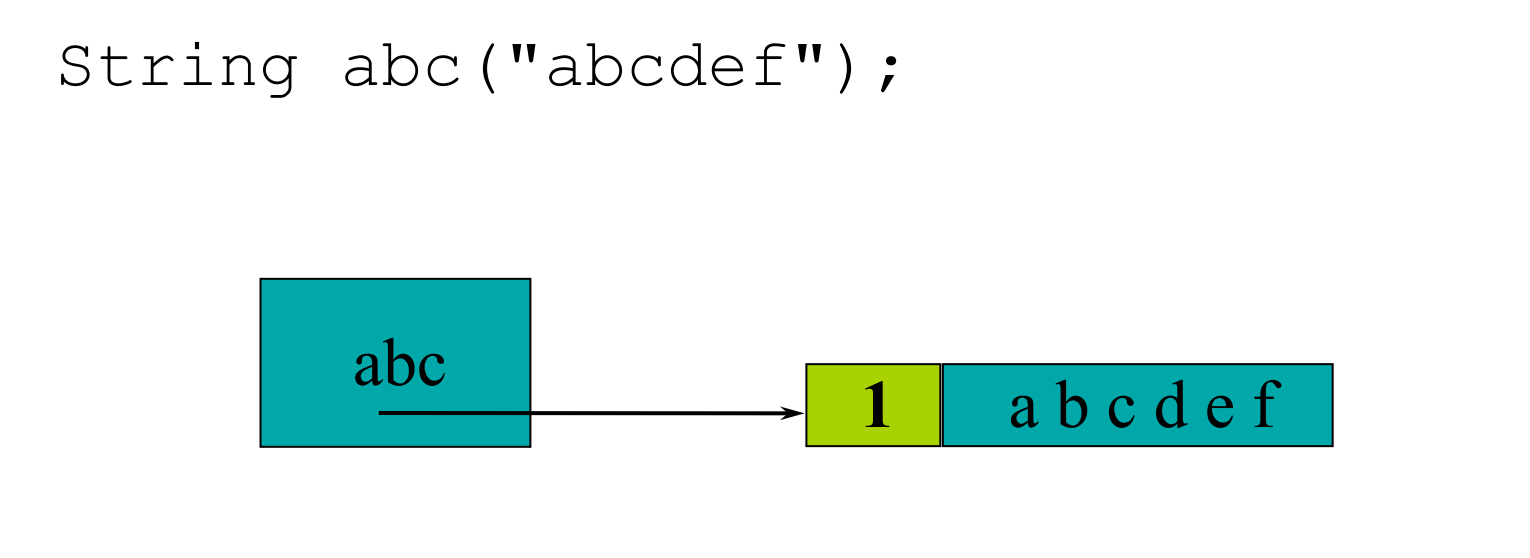
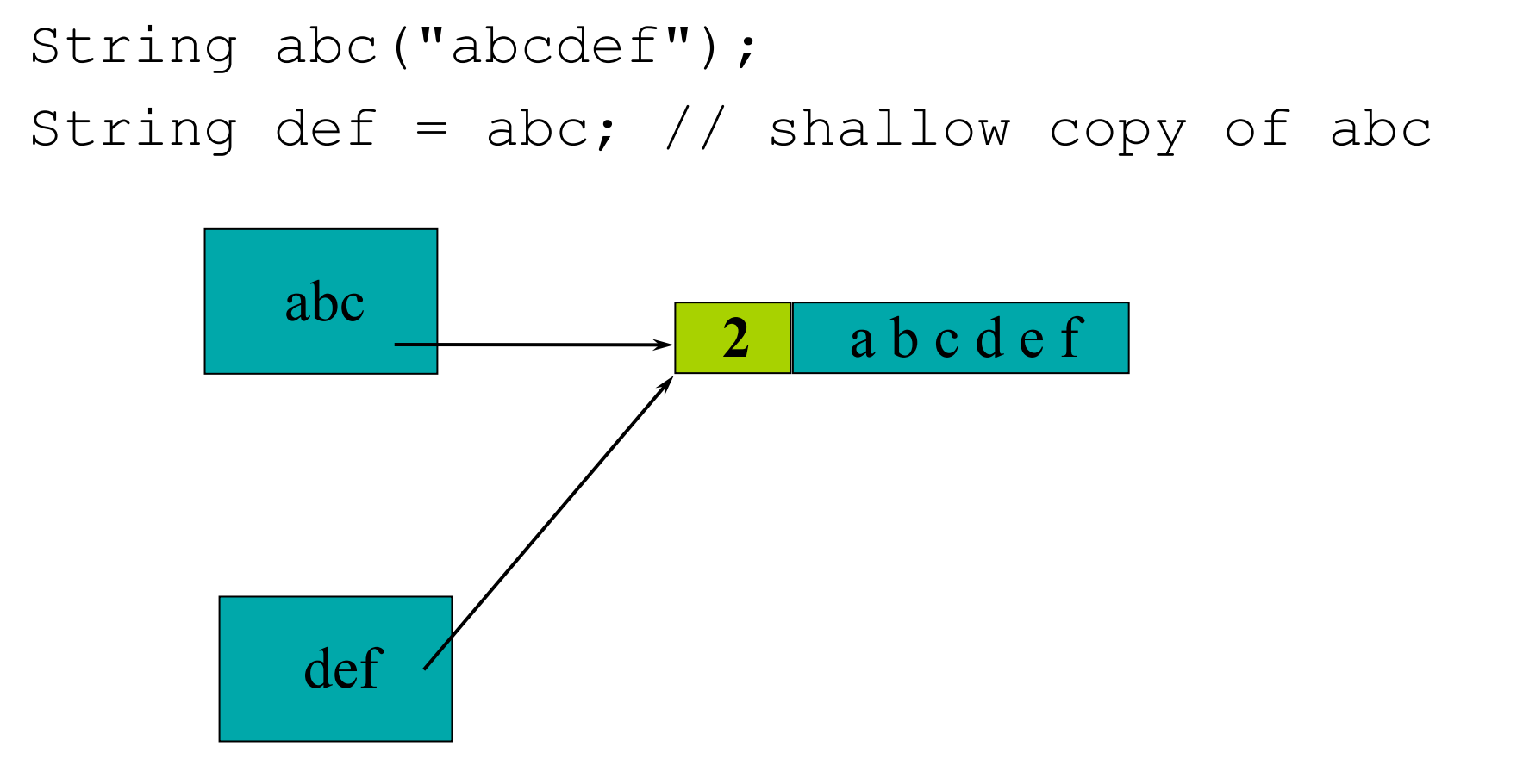
为了节约内存,我们让这两个字符串指向的 "abcdef" 是同一个对象。
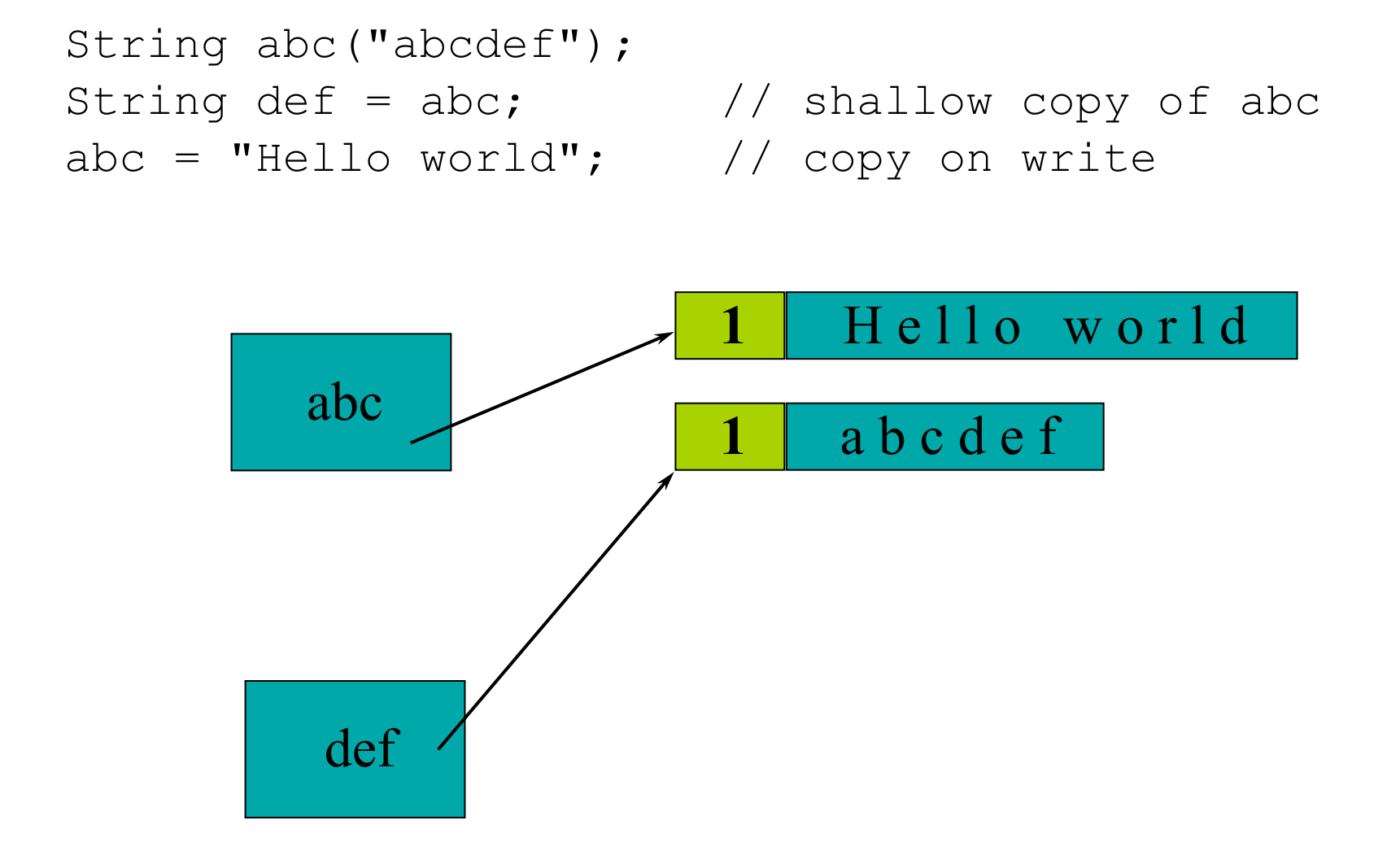
- Each sharable object has a counter
Initial value is 0 - Whenever a pointer is assigned:
p = q;Have to do the following
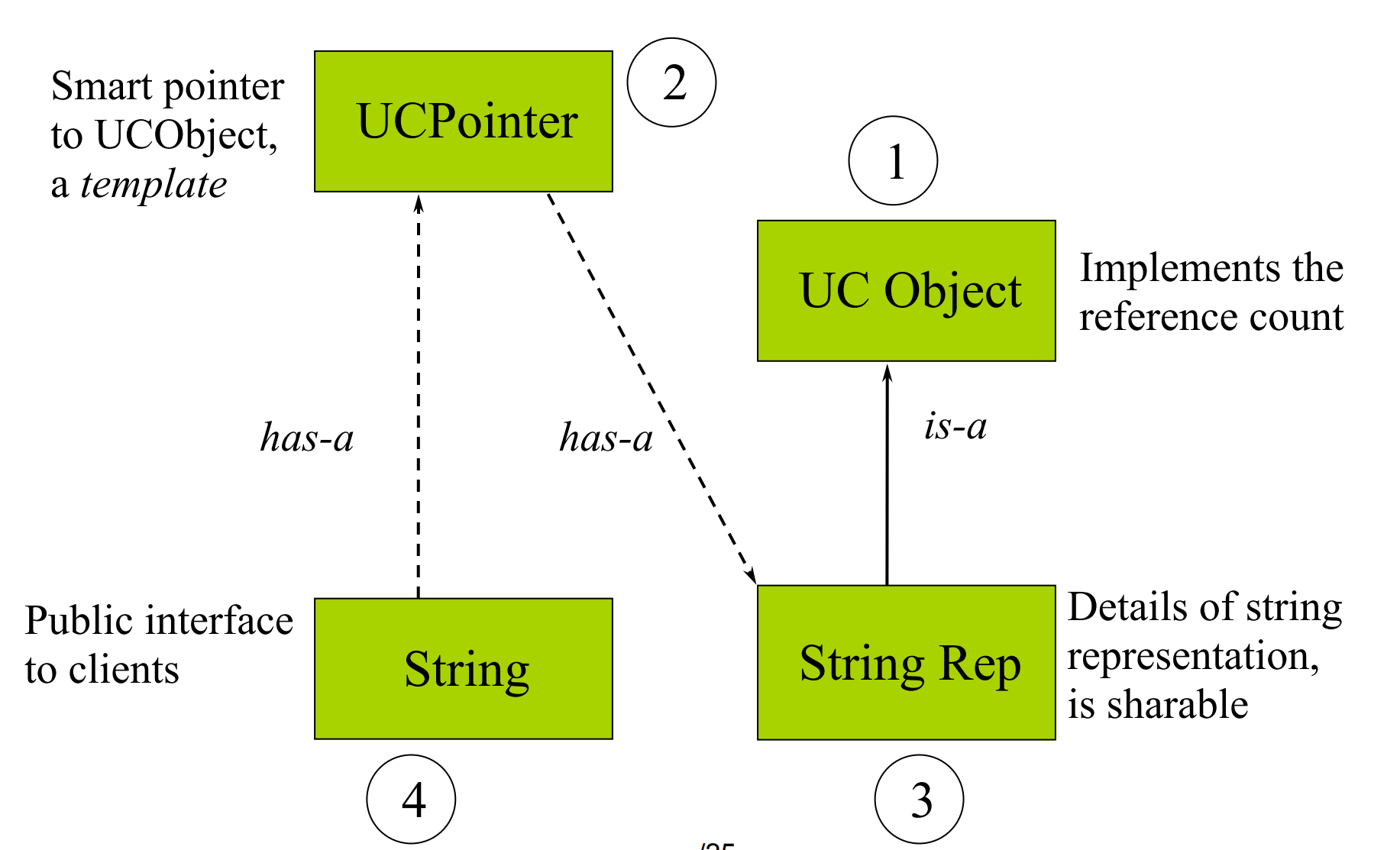
StringRep 继承自 UCObject, 因此内部有引用计数。
String 是外部接口,有一个成员变量是 UCPointer, 指向 StringRep.
UCObject¶
#include <assert.h>
class UCObject {
public:
UCObject() : m_refCount(0) { }
virtual ~UCObject() { assert(m_refCount == 0);}; // 这里 assert, 因为不是对象的问题,是外部的问题。
UCObject(const UCObject&) : m_refCount(0) { } // 不拷贝 refcount
void incr() { m_refCount++; }
void decr();
int references() { return m_refCount; }
private:
int m_refCount;
};
inline void UCObject::decr() {
m_refCount -= 1;
if (m_refCount == 0) {
delete this;
}
}
delete this; 是合法的,但之后不应该再使用 this 指针。
UCPointer¶
template <class T>
class UCPointer {
private:
T* m_pObj;
void increment() { if (m_pObj) m_pObj->incr(); }
void decrement() { if (m_pObj) m_pObj->decr(); }
public:
UCPointer(T* r = 0): m_pObj(r) { increment();}
~UCPointer() { decrement(); };
UCPointer(const UCPointer<T> & p);
UCPointer& operator=(const UCPointer<T> &);
T* operator->() const;
T& operator*() const { return *m_pObj; };
}
template <class T>
UCPointer<T>::UCPointer(const UCPointer<T> & p){
m_pObj = p.m_pObj;
increment();
}
template <class T>
UCPointer<T>&
UCPointer<T>::operator=(const UCPointer<T>& p){
if (m_pObj != p.m_pObj) {
decrement();
m_pObj = p.m_pObj;
increment();
}
return *this;
}
template<class T>
T* UCPointer<T>::operator->() const {
return m_pObj;
}
T 必须继承自 UCObject, 这样才有 incr 的成员函数。 这里只要构造了对象,就会调用
increment 函数。拷贝构造后要对计数加一。
赋值我们要先检查二者指向的是不是同一个对象。
Example: Shape inherits from UCObject
StringRep¶
Envelope and Letter
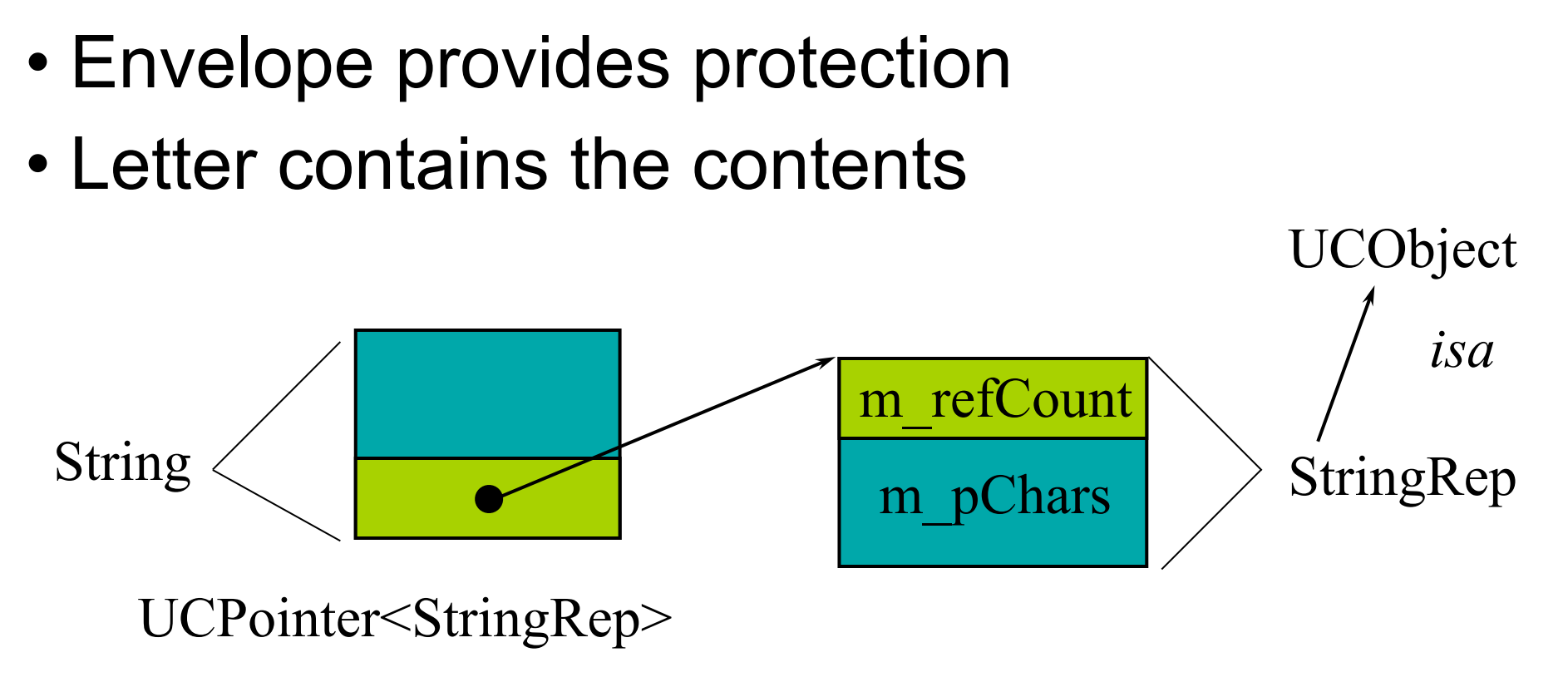
class StringRep : public UCObject {
public:
StringRep(const char *);
~StringRep();
StringRep(const StringRep&);
int length() const{ return strlen(m_pChars); }
int equal(const StringRep&) const;
private:
char *m_pChars;
// reference semantics -- no assignment op!
void operator=(const StringRep&) { } // 私有,外界不能做 StringRep 的赋值
};
StringRep::StringRep(const char *s) {
if (s) {
int len = strlen(s) + 1;
m_pChars = new char[len];
strcpy(m_pChars , s);
} else {
m_pChars = new char[1];
*m_pChars = '\0';
}
}
StringRep::~StringRep() {
delete [] m_pChars ;
}
StringRep::StringRep(const StringRep& sr) {
int len = sr.length();
m_pChars = new char[len + 1];
strcpy(m_pChars , sr.m_pChars );
}
int StringRep::equal(const StringRep& sp) const {
return (strcmp(m_pChars, sp.m_pChars) == 0);
}
\0), 一个字符串和一个长度变量。拷贝构造时会调用 UCObject 的拷贝构造。
String¶
class String {
public:
String(const char *);
~String();
String(const String&);
String& operator=(const String&);
int operator==(const String&) const;
String operator+(const String&) const;
int length() const;
operator const char*() const;
private:
UCPointer<StringRep> m_rep;
};
String::String(const char *s) : m_rep(0) {
m_rep = new StringRep(s);
}
String::~String() {}
// Again, note constructor for rep in list.
String::String(const String& s) : m_rep(s.m_rep) { // 做 UCPointer<StringRep> 的拷贝构造
}
String& String::operator=(const String& s) {
m_rep = s.m_rep; // let smart pointer do work!
return *this;
}
m_rep(0) 实际上是用 0 去做 UCP 的构造(也可以不写,因为默认 0). new 返回的是 StringRep *, 而左边是 UCP<StringRep>, 这里赋值时就会把 StringRep * 转化为 UCP<StringRep>, 再赋值。
int String::operator==(const String& s) const {
// overloaded -> forwards to StringRep
return m_rep->equal(*s.m_rep); // smart ptr *
}
int String::length() const {
return m_rep->length();
}
Summary
- UCPointer maintains reference counts
- UCObject hides the details of the count
String is very clean - StringRep deals only with string storage and manipulation
- UCObject and UCPointer are reusable
代码是可复用的。 - Objects with cycles of UCPointer will never be deleted
UCP 指向的对象永远不被删除。